5. Twelve Monkeys (1995)
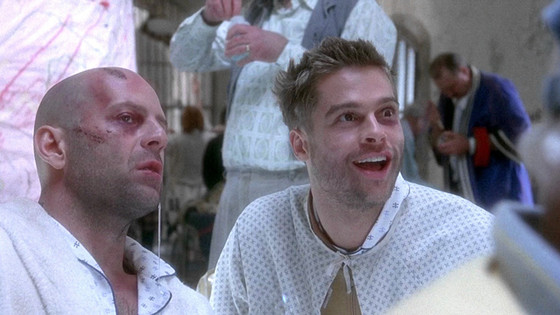
If you haven’t seen this film, then scroll down with your eyes closed for about five seconds because this is going to be a spoilery ride.
A highly contagious virus kills five billion people in 1997; the result is an apocalyptic scenario in which the remaining humanity has moved underground. Bruce Willis is chosen to travel back in time, not to change the events that lead to the disaster, but to look for a pure sample of the virus so that the post-apocalyptic scientists can find a cure.
Long story short, Willis’s character is shot while trying to murder the man guilty of releasing the deadly virus. Also, the protagonist often dreams about a traumatic event of his childhood, where he saw a man getting shot at an airport. In the end, we find out that the man that he saw getting killed was his older self as a time traveler.
This has a lot of mind-blowing implications: the protagonist’s life was conditioned from when he was a child to die in that exact moment, and the reason he died was because he forgot about determinism. The movie establishes that time can’t be changed, not even with a functional time machine, because everything is already predetermined to happen in a certain way.
Willis’s character falls into the illusion of free will, thinking that he can change the past, and ends up fulfilling his destiny of being shot to death. He had a blatant warning that should have been enough for him to avoid getting killed in that way. However, it was already predetermined to happen, and nothing to do against fate.
Do we have free will? No, we all have a fate to fulfill and time machines are useless. When I started watching this movie I didn’t realized that it would kill so many of my dreams.
4. The Thin Red Line (1998)
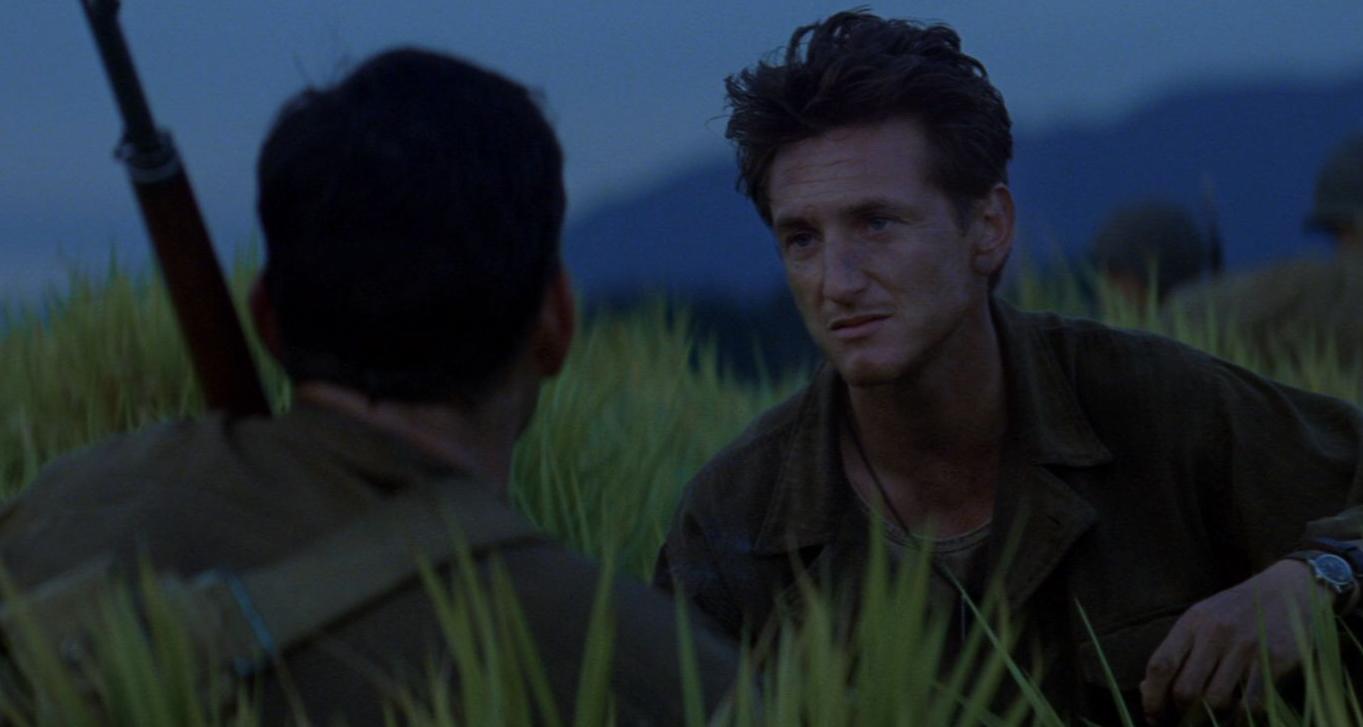
This movie is famous for two things: being one of the greatest war movies of all time, and the fact that director Terrence Malick cast almost every actor in Hollywood and edited out a few of them in post-production.
A poorly known fact, however, are the philosophical implications of this film. As the author of this outstanding article eloquently points out, the entire structure of “The Thin Red Line” is based on the writings of philosopher Arthur Schopenhauer.
Unlike most war movies where the story is told through an individual’s perspective, Malick chooses to approach this phenomenon from various angles. We see each soldier’s point of view, the life choices that got them in the Army, their ways to cope with the horrors of war, their desires and their motivations to stay alive. We also hear their inner monologues, so we understand what they’re experiencing.
An objective reality exists, but it is beyond our grasp; humans can give hundreds of different meanings to the same event. So, in short, all of our personal worldviews are biased and impossible to fully share with others.
Every soldier tries to rationalize the events happening around them, in an attempt to find meaning invested in the horror of war. They’re all alone with their own ways of thinking, believing that their brothers in arms share common thoughts with them, when each of them must bear their own individual cross.
This is why conflict emerges between Lt. Gordon Tall (Nick Nolte) and Capt. James Staros (Elias Koteas). They’re both experiencing the same events; however, Tall believes that the ends justify the means and doesn’t care about losing a few soldiers on the battlefield. Staros considers them his children and isn’t interested in sending his men to a certain defeat and painful death, based on his superior’s reckless orders.
So, if every human lives in their own personal reality that is affected by a number of external factors, how can we make conscious and free choices about the empirical world? If we are trapped in our own subjectivity, then how can our decisions continue to be free? The fact that we could never comprehend the whole picture in any circumstance puts the existence of free will in doubt.
Do we have free will? If we do, it would be very limited by our own philosophies, ideologies and prejudices. So, would it still be free?
3. Memento (2000)
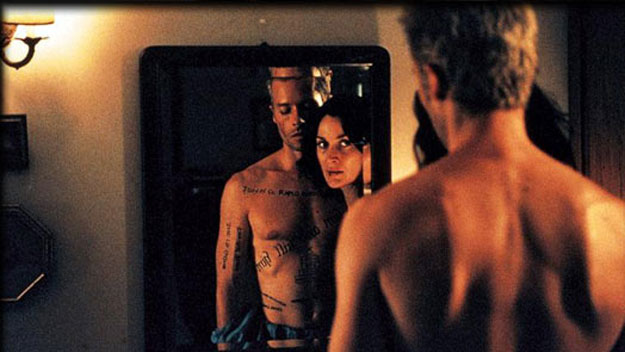
This is the film that put Christopher Nolan on the map. It’s the one that confused thousands of film enthusiasts due to its fragmented storyline, backwards narrative, and Guy Pearce’s sweet drug dealer suit.
Pearce plays a man who suffers from a terrible condition; he can’t form new memories and he forgets everything he’s doing every few minutes, except for a few facts about himself and his life before the incident that caused his mental dysfunctions.
The protagonist’s only goal is to find the man who killed his wife. This makes him act recklessly due to not caring about anything or anyone else, and he murders a few people in order to find his target. He’s also manipulated by a number of individuals, who find out that having a criminal partner that forgets everything once in awhile is a good deal.
It’s not clear if Pearce’s character is really free; the movie is ambiguous in exploring whether he is fully responsible for the crimes he commits. He constantly forgets the motives of his actions, so does that make him innocent? The protagonist may not have acted the way he did if he didn’t suffer from his condition.
If he’s considered mentally incapable, then according to Strawson’s views, he’s not fully responsible; however, he’s still a murderer. Or perhaps, every time he forgets his recent past, he’s a different person, so the true guilty individual doesn’t exist anymore.
Determinists would say that he couldn’t act otherwise, or to be more radical, that none of us can. The movie seems to imply this as well, as when Teddy is explaining to the protagonist the truth about his situation, he says, “So you lie to yourself to be happy. There’s nothing wrong with that. We all do it.” He seems to represent certain deterministic views that people like Wolf Singer defend; he would claim that humans can’t really choose, that our advanced brains do it for us.
“Memento” makes us doubt the veracity of our own memory. It is stated along the way that it isn’t always safe to trust our memories, due to their lack of precision, which is a simple thought I find a bit terrifying.
Do we have free will? It’s debatable, because many of the memories we base our decisions on may not have happened as we remember them.
2. Interstellar (2014)
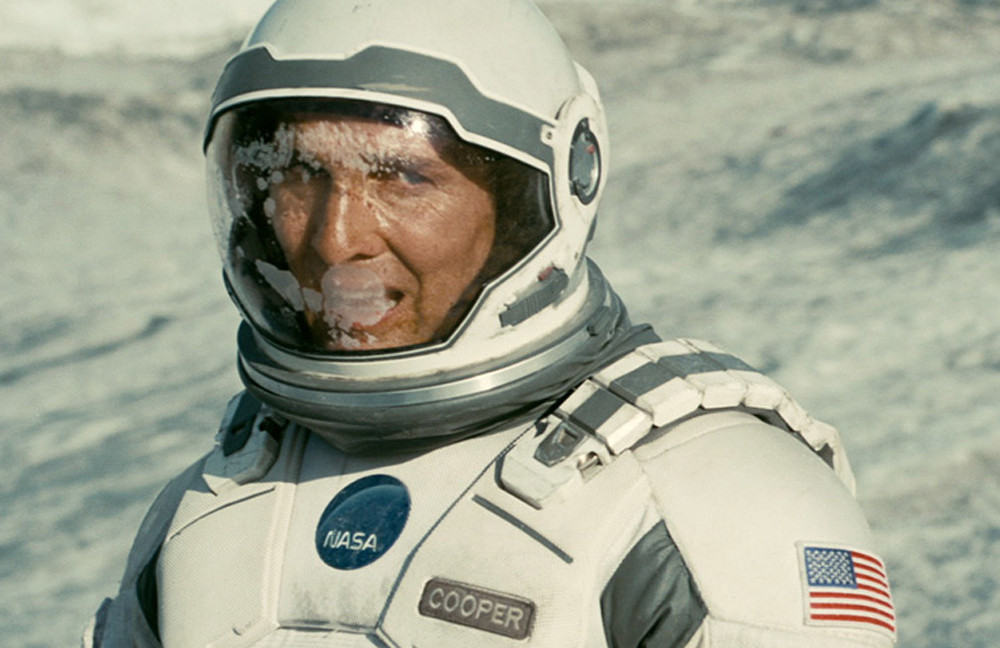
Christopher Nolan’s amazing space epic is no less than an impressive technical achievement, but as is the case for many of his films, the movie’s topics are deeper and more philosophical to what they seem on the surface.
In “Interstellar”, Nolan takes a physicist’s approach on the subject of free will. In the film’s climax, we see how Cooper cruises through the “fifth dimension” where he can see every instant in time from behind his daughter’s bookcase.
This special physical space seems to englobe every other dimension, including time. Cooper is capable to physically see time all together. Past, present and future moments from his daughter’s life are available for his eyes to examine. He can even influence them, and this excites Cooper, as he’s finally able to interact with his daughter for what he believed was the last time.
Being able to perceive time as easily as one perceives any other physical object raises a few questions: does this mean that every event is already predetermined? If every instant is palpable and concrete, then is it impossible to do otherwise? Considering this, everything that happens seems to be written in stone.
The fact that every incident in the universe of “Interstellar” (and maybe in ours as well) was already meant to happen, subtracts any sense of purpose from it.
Do we have free will? No. Every event is already predetermined; we are unaware of this because we can’t perceive the fifth dimension.
1. Mr. Nobody (2009)
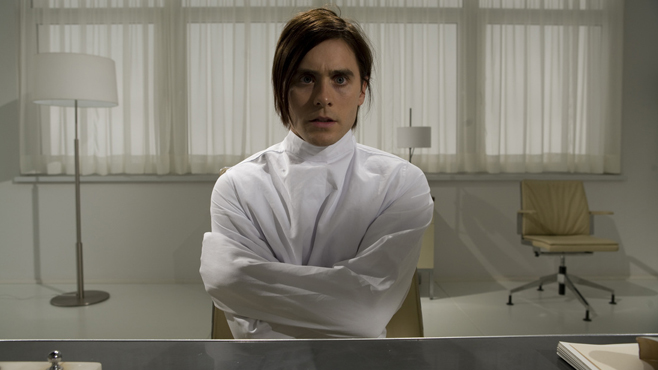
There are many movies that are based on philosophical themes, and various others illustrate interesting philosophical concepts; countless films are influenced by the writings of famous philosophers and some carry out a few philosophical implications within their core. “Mr. Nobody” is a member of all of these groups and is arguably the best at explaining philosophy with the use of images and sharp editing.
It tells the story of Nemo Nobody (Jared Leto), a 118-year-old man who some call C.R.A.F.T. (Can’t Remember a Fucking Thing). He claims to have lived every possible series of events that could have happened to him, and this is of course impossible. Nemo represents a being capable of this feat, one that is aware of every possible life he could have lived, but doesn’t know which life he actually experienced firsthand.
The film depicts the responsibility of the moral being and the angst that comes with the freedom of choice, which is a concept that Sartre carefully constructed in his books.
It also portrays how humans are determined by an infinite number of external causes. From a poorly-made shoelace that alters the course of the protagonist’s life, to an unemployed man boiling an egg, they cause a storm that separates Nemo from the love of his life.
In a few scenes, the protagonist doesn’t seem to know why he acted the way he did, and we see how he causes a violent detour in his destiny for it, as though his brain suddenly decided for him. According to Wolf Singer, this happens all the time; we only notice it once in awhile, but each of our decisions is made by our brains, after comparing favorable versus unfavorable consequences.
We see people’s lives being ruined by sickness, people unable to cope with depression, or suddenly dying from a random event, furthering the thesis of our lack of real control over our lives. The ontology of not choosing is also portrayed. In a key scene, the protagonists says, “as long as you don’t choose, everything remains possible.” This should have been the slogan of the film, because it represents the nature of the plot.
However, the filmmakers don’t offer a straight answer about the existence of free will, they prefer letting us argue about it, and we certainly will.
Do we have free will? Yes, or maybe not, maybe a little bit, or not at all.
Author Bio: Juan studies philosophy. He love films and music and plans to go to film school with his cat.